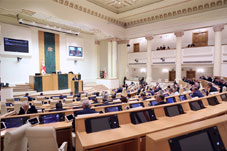
Parliament Adopts Amendments to Laws on Courts and Freedom of Speech
By Liza Mchedlidze
Friday, June 27, 2025
The Parliament has adopted amendments to the Law on Common Courts in the third reading. The bill received support from 80 deputies, with none opposing it. The amendments introduce a ban on photographing and video recording, as well as broadcasting media, within court buildings, courtrooms, and courtyards. Decisions on allowing photo or video recording during court sessions will be made solely by the High Council of Justice.
The bill also introduces liability for any individual who shows disrespect to a judge during a court session or in public, whether through words, gestures, or actions. Additionally, the term for transferring judges increases from two to three years, with the possibility of extending it for an additional two years.
Changes to the structure of the High Council of Justice are also included. The Parliament will now elect only two members instead of five, while the number of judges on the Council will increase from nine to twelve. The President will again appoint one member. The amendments also abolish the Independent Inspector Service and the position of Independent Inspector. Grounds for disciplinary liability of judges are expanded, with failure or improper performance of judicial duties now classified as misconduct.
Parliament also adopted amendments to the Law on Freedom of Speech and Expression in the third reading, supported by 83 deputies with no opposition. The Georgian Dream party considered the bill in an expedited manner.
Several articles are being removed from the current law, with new regulations introduced. Notably, the legal norm placing the burden of proof on the initiator of a restriction on speech is being repealed. In its place, any unproven suspicion must be resolved in favor of protecting freedom of speech.
Another repealed article had protected defendants in defamation cases from being penalized solely for refusing to disclose confidential sources. The new law shifts the burden of proof in defamation cases to the defendant. Plaintiffs will no longer be required to prove that statements made against them are false. Instead, defendants must prove that their statements did not include materially false facts.
The amendments also introduce regulation of both direct and public insults. An existing provision stating that freedom of expression cannot be limited for the sake of private life or personal data if the information is necessary for democratic self-governance is being repealed.
The law also removes the concept of qualified privilege in defamation cases. Previously, a person could avoid liability if they took reasonable steps to verify facts, aimed to protect public interest, made the statement with consent, responded proportionately, or reported fairly. These protections are being eliminated.
The timeframe for resolving defamation disputes is being shortened. The existing one-month period for potential settlement is reduced to ten days. Courts may also require defendants to pay material or non-material damages if a correction or denial is not deemed sufficient.
Finally, the 100-day limitation period for filing defamation lawsuits will continue to apply to statements made before the new law comes into effect, provided the limitation period has not yet expired.

